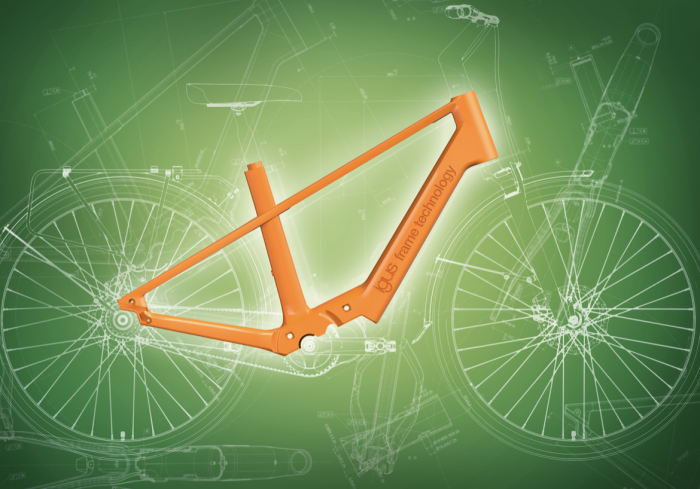igus Develops the First Recyclable Plastic Bicycle Frame

After the RCYL Bike, made from 50% recycled fishing nets, igus sets another milestone for sustainable mobility: the motion plastics specialist has developed a recyclable composite bicycle frame for the German e-bike manufacturer Advanced Bikes, produced via injection molding. Decades of expertise in plastic processing and the experience gained from the RCYL Bike have contributed to the development of this frame and new high-performance plastic bike components.
In 2023, for the first time, more e-bikes were sold in Germany than traditional bicycles. This shift is largely due to the growing environmental awareness. The problem is that 90% of today’s bicycle frames are made of aluminum or carbon, which are produced through very energy-intensive processes and end up in massive bicycle landfills at the end of their life cycle. To drive the transformation towards a circular economy, the e-bike manufacturer Advanced Bikes is relying on igus for its future frame production. Together, the companies have now developed a sustainable composite material bicycle frame, which will be used in the new Reco Urban trekking e-bike. “Advanced’s goal was to create a frame made entirely of recyclable composite material using the injection molding process,” recalls Jan Philipp Hollmann, Head of Bike Components at igus. “Since we have been developing and producing components like plain bearings, rod ends, gears, and guide rails for the bicycle industry for over 30 years, we immediately accepted the challenge to support Advanced in designing the bicycle frame and to handle both development and injection molding.”
New Frame Protects the Environment
To ensure the frame has sufficient strength, stiffness, and low weight, igus uses a composite material in granular form, consisting of high-performance plastics and carbon fibers. Additionally, within a few weeks, igus manufactured a multi-part injection mold for the complex geometry of the bicycle frame. The result: a 3.3 kg lightweight, one-piece injection-molded bicycle frame – without weld seams, corrosion-resistant, durable, and externally tested. Production in Germany enables short delivery routes and demand-driven just-in-time production. igus is also capable of regrinding old frames through its own “chainge” recycling program to reintroduce the material into the value chain. “In the future, we also want to produce other recyclable bicycle components such as luggage racks, rims, spokes, and seat posts using the injection molding process,” explains Helge von Fugler, founder and CEO of Advanced. “Only in this way can a completely recyclable e-bike become a reality.”
Components Made of Lubrication-Free High-Performance Plastics
Currently, igus produces bicycle frames at its headquarters in Cologne using two different processes. Both modular frames and one-piece frames are manufactured using injection molding. Additionally, frames are produced using the rotomolding process – for example, for the company’s own RCYL Bike. However, igus is not limited to bicycle frames. The extensive expertise in plastic processing and new development experiences are now also being applied to new bicycle components – from wheels to cranks and handlebars to planetary gears. Large and small series productions can thus be realized cost-effectively – and all “made in Cologne.” Furthermore, the components made of high-performance plastic are lighter, lubrication-free, and corrosion-resistant. Users can easily use high-pressure cleaners since no lubricant will be washed out, and nothing can rust.
Maximum Safety Thanks to Extensive Testing
Before being put into use, igus extensively tests all components. Each year, 135 trillion test cycles and 15,000 trials are conducted in the 4,000-square-meter igus test lab in Cologne. Of this, 250 square meters are dedicated to test stands where all bicycle components are tested, including the new Reco frame. Hollmann states, “We will use computed tomography to examine the first injection-molded bicycle frames for potential issues such as air inclusions in the composite material and conduct all relevant frame tests in our test lab.” Customers receive a 30-year warranty from Advanced. For maximum safety, igus relies on a variety of testing methods. “These are based on standard tests, such as those from EFBE and TÜV,” emphasizes Hollmann. “In addition, we also conduct our own test procedures – for example, in our climate chamber.” The data obtained from these tests allows for precise predictions regarding the lifespan of igus materials under different environmental conditions.
Everything from a Single Source: From Design to the Finished Product
“With our high-performance plastic bicycle components, we provide the bicycle industry access to a completely new technology,” says Hollmann. “We also appeal to OE manufacturers who want to innovate their own ideas and designs with us.” Using plastic allows developers to completely rethink design and geometry. At igus, they get everything from a single source: from design to research and development, tool construction, compounding, testing, production, and even recycling. Thanks to just-in-time production, igus can deliver quickly, reducing inventory capacity for customers. This made-to-order production makes business more predictable and profitable.
Visit igus at Eurobike 2024 in Frankfurt am Main (Hall 8.0, Stand H22) to learn more about bicycle components made from motion plastics.
For more information, please visit: https://www.igus.de
News Categories
- » NEWS HOME
- » Automation & Robotics
- » Industry 4.0
- » Material Handling
- » Sensors
- » Quality & Testing
- » Machine Vision
- » Laser & Optics
- » Metalworking
- » Motion Control & Drives
- » Hydraulics & Pneumatics
- » Process Industry
- » Renewable Energy
- » Agriculture
- » Home & Office Furniture
- » Environmental Tech


